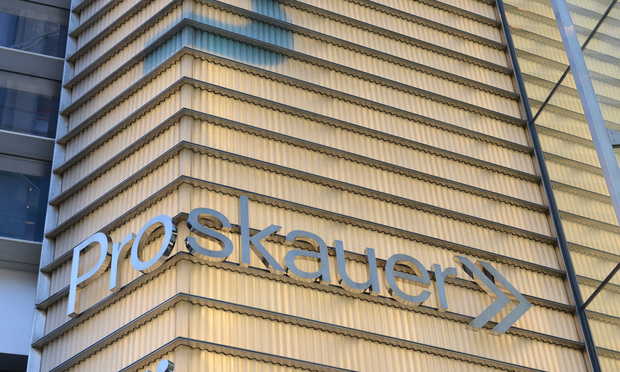Nothing 'Sinister' in Forced Arbitration, Proskauer Lawyer Tells EEOC Task Force
“Bad facts make bad law,” Proskauer Rose partner Kathleen McKenna told an EEOC task force studying sexual harassment in the workplace. “A rise in voices suggests arbitration and resolution with nondisclosure agreements are acts of secrecy with sinister connotations. Respectfully, these conclusions, generally, are incorrect.”
June 11, 2018 at 06:15 PM
5 minute read

A Proskauer Rose partner told a U.S. Equal Employment Opportunity Commission task force on Monday that efforts to restrict workplace arbitration and nondisclosure agreements would be “counterproductive,” harming employees as much as management.
Kathleen McKenna's testimony highlighted tension over how best to tackle sexual harassment in the workplace in the wake of the #MeToo movement, which has inspired industrywide challenges to practices that employee-advocates say have silenced victims and allowed bad behavior to persist unchecked.
Arbitration provides a neutral and confidential process to resolve harassment complaints, McKenna, a Proskauer partner in New York who represents employers, told EEOC members and experts weighing these issues during a wide-ranging task force meeting that was convened to study sexual harassment in the workplace. Prohibiting nondisclosure agreements could lead to an increase in litigation rather than private resolution, McKenna said.
“Bad facts make bad law,” McKenna told the EEOC. “A rise in voices suggests arbitration and resolution with nondisclosure agreements are acts of secrecy with sinister connotations. Respectfully, these conclusions, generally, are incorrect.”
The task force, which issued sexual harassment guidelines in June 2016, heard from a variety of experts on Monday, offering a range of perspectives amid the flood of media reports in recent months highlighting workplace misconduct in Hollywood, the financial arena and other sectors.
Debra Katz of Washington's Katz, Marshall & Banks, representing workers and whistleblowers, said gaps in federal law hurt workers, “particularly those in low-wage jobs who are vulnerable to retaliation.” Katz said the #MeToo movement “has given unprecedented insight into why women's harassers have been enabled.”
Across the country, state legislatures and some federal lawmakers have passed laws addressing issues including arbitration processes and nondisclosures. Suzanne Hultin of the National Conference of State Legislatures, testifying Monday, said more than 125 pieces of legislation have been introduced in 32 states that are looking beyond federal regulations to prevent workplace sexual harassment. Hultin said the proposals to address and prevent harassment would continue to be a priority for state legislatures this year and next.
In the eight months since media reports exposed Hollywood producer Harvey Weinstein for alleged sexual harassment and abuse, the EEOC said it has not seen an uptick in charges filed in this area.
EEOC chair Victoria Lipnic and Chai Feldblum, a commissioner, suggested that the number of incoming complaints is not necessarily a measure of the success or failure of the movement. The commissioners said anecdotal evidence suggests employees ever more are using internal complaint processes at companies. A rise in internal reporting could show victims are less fearful of coming forward and of retaliation consequences and that it could take more time before disputes reach the EEOC.
Feldblum said it's unclear whether she and Lipnic would see eye to eye on how best to reach a position on arbitration and nondisclosure agreements.
Lipnic is currently the sole Republican on the commission. Feldblum, who was nominated for another five-year position by the Trump administration, and Charlotte Burrows are the Democratic members. Trump administration nominees Janet Dhillon, former Burlington Stores Inc. general counsel and West Point professor Daniel Gade are awaiting confirmation in the U.S. Senate.
Monday's discussion came just weeks after a divisive U.S. Supreme Court ruling that upheld the lawfulness of employment agreements that block worker class actions. Workers' rights groups contend the justices' ruling could work against the power of employees to collectively sue over alleged harassment.
The EEOC select task force on the study of harassment in the workplace consists of representations of academia and social science, legal practitioners on the plaintiff and defense sides; employer and employee advocacy groups and organized labor. The 2016 report led to an EEOC training program that has been used in more than 200 training sessions for 5,200 employees and supervisors in 18 states.
Read more:
7th Circuit Strips Jones Day's $307K Legal-Fee Award in EEOC Case
EEOC Sues Walmart for Alleged Discrimination Against Two Deaf Employees
EEOC Takes 'Zarda' LGBT Win on the Road to Another US Appeals Court
Sharon Gustafson, EEOC General Counsel Pick, Discloses Law Firm Income, Clients
Suspending Obama-Era Pay Data Rule Was Lawful, DOJ Tells Court
➤➤ Get employment law news and commentary straight to your in-box with Labor of Law, a new Law.com briefing. Learn more and sign up here.
This content has been archived. It is available through our partners, LexisNexis® and Bloomberg Law.
To view this content, please continue to their sites.
Not a Lexis Subscriber?
Subscribe Now
Not a Bloomberg Law Subscriber?
Subscribe Now
NOT FOR REPRINT
© 2025 ALM Global, LLC, All Rights Reserved. Request academic re-use from www.copyright.com. All other uses, submit a request to [email protected]. For more information visit Asset & Logo Licensing.
You Might Like
View All
Lavish 'Lies' Led to Investors Being Fleeced in Nine-Figure International Crypto Scam
3 minute read
SEC Puts Beat Down on Ex-Wrestling CEO Vince McMahon for Not Reporting Settlements
3 minute read
DOJ Files Antitrust Suit to Block Amex GBT's Acquisition of Competitor
Trending Stories
- 1'It's Not Going to Be Pretty': PayPal, Capital One Face Novel Class Actions Over 'Poaching' Commissions Owed Influencers
- 211th Circuit Rejects Trump's Emergency Request as DOJ Prepares to Release Special Counsel's Final Report
- 3Supreme Court Takes Up Challenge to ACA Task Force
- 4'Tragedy of Unspeakable Proportions:' Could Edison, DWP, Face Lawsuits Over LA Wildfires?
- 5Meta Pulls Plug on DEI Programs
Who Got The Work
Michael G. Bongiorno, Andrew Scott Dulberg and Elizabeth E. Driscoll from Wilmer Cutler Pickering Hale and Dorr have stepped in to represent Symbotic Inc., an A.I.-enabled technology platform that focuses on increasing supply chain efficiency, and other defendants in a pending shareholder derivative lawsuit. The case, filed Oct. 2 in Massachusetts District Court by the Brown Law Firm on behalf of Stephen Austen, accuses certain officers and directors of misleading investors in regard to Symbotic's potential for margin growth by failing to disclose that the company was not equipped to timely deploy its systems or manage expenses through project delays. The case, assigned to U.S. District Judge Nathaniel M. Gorton, is 1:24-cv-12522, Austen v. Cohen et al.
Who Got The Work
Edmund Polubinski and Marie Killmond of Davis Polk & Wardwell have entered appearances for data platform software development company MongoDB and other defendants in a pending shareholder derivative lawsuit. The action, filed Oct. 7 in New York Southern District Court by the Brown Law Firm, accuses the company's directors and/or officers of falsely expressing confidence in the company’s restructuring of its sales incentive plan and downplaying the severity of decreases in its upfront commitments. The case is 1:24-cv-07594, Roy v. Ittycheria et al.
Who Got The Work
Amy O. Bruchs and Kurt F. Ellison of Michael Best & Friedrich have entered appearances for Epic Systems Corp. in a pending employment discrimination lawsuit. The suit was filed Sept. 7 in Wisconsin Western District Court by Levine Eisberner LLC and Siri & Glimstad on behalf of a project manager who claims that he was wrongfully terminated after applying for a religious exemption to the defendant's COVID-19 vaccine mandate. The case, assigned to U.S. Magistrate Judge Anita Marie Boor, is 3:24-cv-00630, Secker, Nathan v. Epic Systems Corporation.
Who Got The Work
David X. Sullivan, Thomas J. Finn and Gregory A. Hall from McCarter & English have entered appearances for Sunrun Installation Services in a pending civil rights lawsuit. The complaint was filed Sept. 4 in Connecticut District Court by attorney Robert M. Berke on behalf of former employee George Edward Steins, who was arrested and charged with employing an unregistered home improvement salesperson. The complaint alleges that had Sunrun informed the Connecticut Department of Consumer Protection that the plaintiff's employment had ended in 2017 and that he no longer held Sunrun's home improvement contractor license, he would not have been hit with charges, which were dismissed in May 2024. The case, assigned to U.S. District Judge Jeffrey A. Meyer, is 3:24-cv-01423, Steins v. Sunrun, Inc. et al.
Who Got The Work
Greenberg Traurig shareholder Joshua L. Raskin has entered an appearance for boohoo.com UK Ltd. in a pending patent infringement lawsuit. The suit, filed Sept. 3 in Texas Eastern District Court by Rozier Hardt McDonough on behalf of Alto Dynamics, asserts five patents related to an online shopping platform. The case, assigned to U.S. District Judge Rodney Gilstrap, is 2:24-cv-00719, Alto Dynamics, LLC v. boohoo.com UK Limited.
Featured Firms
Law Offices of Gary Martin Hays & Associates, P.C.
(470) 294-1674
Law Offices of Mark E. Salomone
(857) 444-6468
Smith & Hassler
(713) 739-1250











